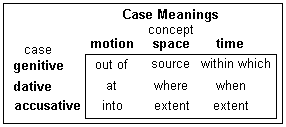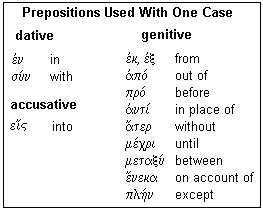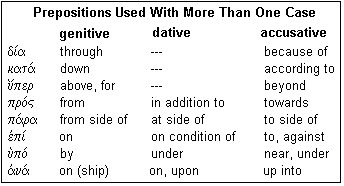Lesson ια': Prepositions
When languages had many cases, the relationships of different nouns to each other could be expressed fairly clearly. As the number of cases shrank, this became more and more ambiguous. With all the cases gone, as in English, the matter is hopeless, and in Greek, with only three oblique cases, not a great deal better. For this reason, people began adding little words to their speech, taking them from various adverbs and such, to help out the cases and make matters clear. These little words are called prepositions, because they generally precede the word to which they refer (although they may follow in some cases). Some prepositions, expressing detailed relations, are used with only a single case, but others are used with several cases, and mean different things depending on the case. Therefore, it is best to consider a preposition as helping out a case, not as something that has an "object" as in many grammar books.
 Let us, then, begin by reviewing the uses of the oblique cases (those other than the nominative). Elementary grammars generally say that the genitive is possession, dative indirect object, and accusative direct object. True enough, but only partially true, and does not get to the heart of the matter. The box shows us the general meanings of the oblique cases when referring to motion, space and time. In some situations, nouns can be used in the case alone, without a preposition, when the meaning is clear. We must also allow that sometimes the meaning is figurative, not concrete.
Let us, then, begin by reviewing the uses of the oblique cases (those other than the nominative). Elementary grammars generally say that the genitive is possession, dative indirect object, and accusative direct object. True enough, but only partially true, and does not get to the heart of the matter. The box shows us the general meanings of the oblique cases when referring to motion, space and time. In some situations, nouns can be used in the case alone, without a preposition, when the meaning is clear. We must also allow that sometimes the meaning is figurative, not concrete.
 Some prepositions are used with a single case. It is easy to see why the two used with the dative and the two used with the accusative go with these cases. Most of the rest are used with the genitive (yet another ablative use!). In some cases, the English idiom also uses "of", but this cannot be relied upon to give the case.
Some prepositions are used with a single case. It is easy to see why the two used with the dative and the two used with the accusative go with these cases. Most of the rest are used with the genitive (yet another ablative use!). In some cases, the English idiom also uses "of", but this cannot be relied upon to give the case.
 Some of the most-used prepositions accompany two or three cases, and the meaning changes depending on the case, as shown in the box. The meanings of the first three are inconsistent with the dative case, so they are not used with it. The others are used with all three oblique cases.
Some of the most-used prepositions accompany two or three cases, and the meaning changes depending on the case, as shown in the box. The meanings of the first three are inconsistent with the dative case, so they are not used with it. The others are used with all three oblique cases.
Return to Contents
Composed by J. B. Calvert
Created
Last revised
 Let us, then, begin by reviewing the uses of the oblique cases (those other than the nominative). Elementary grammars generally say that the genitive is possession, dative indirect object, and accusative direct object. True enough, but only partially true, and does not get to the heart of the matter. The box shows us the general meanings of the oblique cases when referring to motion, space and time. In some situations, nouns can be used in the case alone, without a preposition, when the meaning is clear. We must also allow that sometimes the meaning is figurative, not concrete.
Let us, then, begin by reviewing the uses of the oblique cases (those other than the nominative). Elementary grammars generally say that the genitive is possession, dative indirect object, and accusative direct object. True enough, but only partially true, and does not get to the heart of the matter. The box shows us the general meanings of the oblique cases when referring to motion, space and time. In some situations, nouns can be used in the case alone, without a preposition, when the meaning is clear. We must also allow that sometimes the meaning is figurative, not concrete. Some prepositions are used with a single case. It is easy to see why the two used with the dative and the two used with the accusative go with these cases. Most of the rest are used with the genitive (yet another ablative use!). In some cases, the English idiom also uses "of", but this cannot be relied upon to give the case.
Some prepositions are used with a single case. It is easy to see why the two used with the dative and the two used with the accusative go with these cases. Most of the rest are used with the genitive (yet another ablative use!). In some cases, the English idiom also uses "of", but this cannot be relied upon to give the case. Some of the most-used prepositions accompany two or three cases, and the meaning changes depending on the case, as shown in the box. The meanings of the first three are inconsistent with the dative case, so they are not used with it. The others are used with all three oblique cases.
Some of the most-used prepositions accompany two or three cases, and the meaning changes depending on the case, as shown in the box. The meanings of the first three are inconsistent with the dative case, so they are not used with it. The others are used with all three oblique cases.